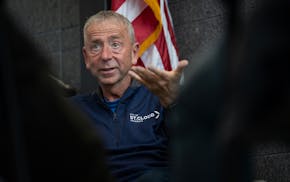No Minnesotan should be surprised by the off-the-field screw-ups that have made this an especially embarrassing period for the University of Minnesota's Athletic Department. Deeply disappointed, yes, but not surprised. As long as the university's coaches take chances recruiting at-risk student-athletes in an effort to win at almost any cost, police and lawyers will make frequent visits to campus.
And if the athletes most likely to offend in the future see that the most serious punishment handed out in these cases amounts to a few missed games and extra wind sprints, the out-of-control culture will flourish. Unfortunately, the initial disciplinary response to the latest batch of troubles does not inspire confidence that coaches and Athletic Department officials will come down hard enough on troublemakers to get the attention of the rest of their players.
"It seems to snowball," Athletic Director Joel Maturi told the Star Tribune last week. "When you have so many instances at one time, you wonder, what's going on at the asylum?" That's the right question, but it's one the athletic director and his multimillion-dollar coaches should be answering, not asking.
For his part, football coach Tim Brewster boldly confronted last week's arrest of top freshman Michael Carter and said the promising defensive back would play against Illinois. Come again? It would seem an arrest for underage drinking and obstruction of the legal process -- an officer had to point a taser gun at Carter when he resisted -- might lead to a suspension. Instead, Brewster said the matter would be handled "internally," which may be code for those wind sprints. And Maturi, despite being concerned about snowballs at the asylum, was supportive and said the department is looking for consistency in handling such incidents. "Sometimes the sanctions are obvious (and) become public," he said. "At this moment (not suspending Carter) is OK with me. We'll continue to make sure we do the appropriate thing." We're guessing that slapping wrists, however consistently, won't bring much improvement.
The men's basketball program is doing its part. Royce White, Minnesota's Mr. Basketball and, despite academic problems in high school, the cornerstone recruit in coach Tubby Smith's incoming class, was arrested Oct. 13 for shoplifting and fifth-degree assault at Macy's in the Mall of America. An unlucky Macy's security guard tried to handcuff the 6-8, 240-pound power forward after he tried to steal about $100 worth of merchandise, according to the police report. White, who shoved the guard to the ground a couple of times before reinforcements arrived, received a one-year trespass notice from the megamall, but he may not be banished for long from Williams Arena.
Smith said White and senior guard Devron Bostick were suspended indefinitely for an unspecified violation of team rules, but he would not elaborate. The punishment? A suspension ranging from two to 20 games, according to the less-than-transparent head coach. Given the apparent priorities at the U these days, the odds seem good that White will appear on the court long before the team opens Big Ten play on Dec. 29.
Meanwhile, the busy Maturi announced that transfer basketball player Trevor Mbakwe will not be allowed to play until his legal problems are cleared up. Mbakwe is facing a felony assault charge for allegedly punching a woman in the face in Miami in April, although his attorney argues that he was mistakenly identified.
Some fans argue that the number of academic and disciplinary cases at the U is typical of many major college programs. In fact, the White arrest brought to mind the case of Diamond Taylor, a prized University of Wisconsin freshman basketball player who, along with teammate Jeremy Glover, was arrested this fall after stealing iPods, a cell phone and $400 from campus residences.
But unlike Minnesota, Wisconsin immediately turns such cases over to a disciplinary committee, taking the punishment decisions out of the hands of win-hungry coaches. Both Taylor and Glover were immediately kicked off the team after their arrests, and the committee denied Glover's appeal last week. Taylor, who got a strong signal that he was no longer wanted in Madison, quickly moved on to Southern Illiniois University. The message to Wisconsin athletes: If you screw up off the court or field, expect serious consequences.
University President Robert Bruininks needs to send a strong signal of his own to Maturi and his coaches. The long list of academic issues, NCAA violations and criminal cases at the U is unacceptable and should not be tolerated.

Kudos to St. Cloud's longtime mayor
Readers Write: Ethnic studies curriculum, public notice laws, student protests


